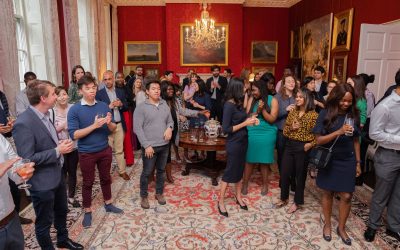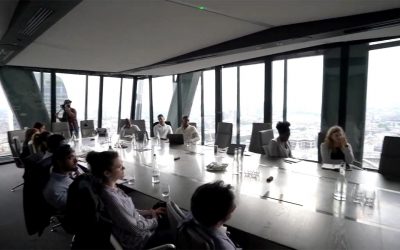Seb Butt wrote a full article on our reasons for launching the programme last November. The main points of which can be boiled down to:
There’s a clear lack of diversity in VC funds
Research done by Diversity VC has shown that as of last year
- 30% of the UK VC industry’s workforce identified as women (the number goes down to 13% at partner level);
- 76% of the workforce identify as white, compared to 59% of the workforce in London where many VCs are based;
- 20% went to Oxford, Cambridge, Harvard, or Stanford. Separately, 1 in 5 will also have an MBA or other degree from a business school;
- 8% have worked in a startup before – perhaps surprising for an industry that invests in the companies of tomorrow.
Selective hiring approaches cause a lack of industry awareness
As the statistics above show, VCs like to hire from the same universities. These universities in turn typically take in students from similar backgrounds.
Even to people who attend these universities or are working in other parts of the finance world VC can seem like this strange little side project they know very little about. With most recruitment outreach focussed on the four institutions above that have fairly low representation of BAME or working class individuals, people from these backgrounds are far less likely to know that the VC industry exists, much less apply for jobs in it.
Internships offer a clear solution
Seb discusses how Future VC looks for underrepresented talent in his blog post. Once we’ve found that talent and told people that Venture Capital exists, an Internship programme feels like the logical next step. It provides an opportunity to learn a bit more about the industry and introduces a whole new network of people to funds that they previously hadn’t known how to tap into – a win-win situation that just makes sense!
The results from last year show that this was correct: of the 30 interns who joined Future VC either in person or remotely, 4 are now working in VC full time. When you consider the size of the VC industry and a fund’s typical hiring cycle that number is pretty staggering.
This year our plan was to make Future VC bigger and better, extending the programme to 8 weeks and increasing the number of participating funds to 33 in a wider geography that also included Paris, Berlin, and Amsterdam. However, as we all know, 2020 had other plans.
With offices closed across the continent due to Covid 19 we decided not to offer placements at funds. We feel quite strongly that as an intern most of what you learn doesn’t come from projects set by your employer but from the conversations you have grabbing a coffee with a colleague. No office environment means no coffee chats and less opportunity to learn. Add to this the financial insecurity so many faced due to lockdown and we felt that virtual placements weren’t going to be the way forward this year.
However, lockdown didn’t change the fact that there was still a huge pool of fantastically talented individuals who could thrive in VC if they had the information and tools to do so. Diversity VC are on a mission to make Venture a more diverse and inclusive community and we were determined that Covid 19 would not negatively impact representation in the industry. Therefore, instead of offering online internships this summer we decided to focus on the masterclasses we would have offered alongside these placements. We expanded our curriculum to a 7 week webinar series covering all the basics of a career in VC, delivered to an online community of potential Future VCs. We also cut out a lot of the assessment process during application, giving us an opportunity to share knowledge and understanding with a much larger group of people, remove some of the mystery surrounding VC, and empower the cohort to use their voice in pushing VC to make the changes needed.
And expand our offer we did. Over 7 weeks we delivered:
- 28 masterclasses featuring 34 speakers, all of whom are currently working in the VC industry in the UK, Continental Europe, and the USA.
- 6 ‘bonus sessions’ featuring another 12 speakers covering journeys into VC, pitching skills, ecosystems, employee stock options, and more.
- 200 mentors – an huge influx of VCs offering their time to support our cohort meant we were able to add curated 1:1 or 1:2 mentoring to our offer for some of the cohort.
It wasn’t just the cohort that benefited. As funds have got back into hiring over the last month or so we’ve been able to offer a pool of diverse candidates to hire from. Since we started the programme in June 8 participants have been hired as interns at various funds and we currently have a number of candidates at various stages with other funds in Europe and the US.
As for reaching a larger group? We jumped from 30-40 interns based in the UK/Western Europe to working with a cohort of just under 500 people from 177 cities around the world.
When we sent out a survey to our final cohort, results from 313 of them told us that
- 46% of the cohort identified as Women
- 49% identified as BAME
- 2% identified as LGBTQ+
- 20% were the first in their family to go to university
- 14% came from a family in receipt of social welfare
- 4% identified as having some form of disability
These numbers aren’t perfect, we’re looking at our outreach to make sure we are more representative next year and we need to do more research to see what the comparable statistics are within the wider VC industry. However we’re proud that based on our 2019 statistics representation across gender and ethnicity in our cohort is significantly higher than in the broader VC industry today.
A global cohort
It’s fair to say that Future VC 2020 wasn’t quite the programme we were planning back in March. However if the lessons learnt have been half as valuable to the participants as they have been to us then I’m confident our worldwide cohort can make a real difference to the industry!
Speaking of those lessons learnt by us, here are a few highlights:
Pivoting a programme in 3 weeks is insane
Seriously, what were we thinking? When the UK first went into lockdown we put a pause on all activity at Diversity VC as funds figured out how to make things work under the circumstances . We needed to figure things out for our team too, I’m the only employee at this otherwise volunteer-led organisation and everyone else has a full time job which they also needed to move online in lockdown. By the time we had next steps confirmed we had 3 weeks to take everything online, confirm speakers, and recruit a new cohort.
There is no way this would have happened without the rest of Diversity VC and in particular Future VC’s founder and Programme Director Seb Butt, who helped drive outreach, confirm speakers, and whose WhatsApp must now hold enough messages from me confirming topics/timings/availabilities to fill a small novel. A HUGE thank you is also due to Sarah Millar, head of Diversity VC USA, who proposed, designed, and managed the entire mentoring scheme – an aspect we hadn’t originally thought we’d be able to include given the team’s capacity.
There is a real, international, appetite for programmes like this
We aren’t the only education/internship programme getting more diverse candidates into VC and I’d be interested to hear about other Programme Managers’ experiences going virtual this year (if you’re reading, get in touch). For our part, we initially thought that if we could reach 300 people from Europe and maybe North America we’d be making our 10x return on impact delivered and doing pretty well. When we saw the final figures for our cohort we had to reassess some of our sessions as we realised how far reaching our audience was going to be!
Agile planning aside, this shows just how many people there are who would be interested in pursuing a career in VC if they just had the information and opportunities to do so.
Not only are there a lot of people interested in VC across the globe, they’re really really impressive
If you’re looking to hire at your fund let us know because this was one of the most engaged, proactive cohorts I’ve worked with: hosting extra sessions on topics of interest, organising networking events, setting up community groups on other platforms and even (possibly) an angel group to try their hand at finding deals. From a personal point I want to say that Seb, Sarah, and I would not have had capacity to manage all these extra discussions and events alone so THANK YOU for being incredible.
VC is an industry driven by network, but what a generous and committed network it is
Between our presenters, mentors, and volunteers offering to help next year the number of people who have offered up their time for the programme and its participants has been truly humbling.
The timing for this programme couldn’t have been more pertinent. We launched our online masterclasses on the 9th June, just two weeks after the tragic killing of George Floyd. Future VC ’19 alumnus Joshua Olusanya and his colleague Vanessa Sefa spoke out about the VC industry’s apparent apathy at the time and some funds have since released statements of intent to support more black founders. For our part at Diversity VC we continue to work to elevate black voices in the industry and are proud to stand with Black Lives Matter.
However we all know that actions speak louder than words and it gives me great hope for the future that so many have acted on their words by volunteering their time for this programme over the past 7 weeks. We had people calling from their holidays, honeymoons, fitting us around already hectic schedules, and being so generous with their insight and knowledge of the industry – thank you everyone who was involved and we look forward to working with you all again next year and beyond.
Our amazing masterclass and bonus session presenters (including 3 Future VC participants)
We hope to bring back Future VC’s original format next year and are planning to expand to more funds across Europe as well as launch Future VC East Coast. We will certainly be looking at how we can incorporate this year’s learnings alongside these programmes to reach as many people as possible. Look out for our new website, due to be launched next month, and in the meantime you can find any further updates on Seb and my Twitter profiles.




